Anna Quindlen: “Who Doesn’t Take Criticism Personally?”
March 16, 2018 | Filed in: Woman of the Week
If you didn’t grow up reading Anna Quindlen’s columns in The New York Times (she won a Pulitzer Prize for commentary in 1992), you’re certainly familiar with her best-selling books, including Miller’s Valley, Still Life With Bread Crumbs, and One True Thing. She’s written nine novels to date; her latest, Alternate Side, comes out this week. She recently hosted us at her cozy townhouse on the Upper West Side (mid-blizzard, no less) to discuss her evolution from newspaper reporter to fiction writer, the advantages of being “average,” and why she stopped reading her own book reviews.
I WAS ALWAYS MOTIVATED to do interesting, unusual, and terrifying work. That’s my bottom line: I like to take on work that makes me think to myself, I can’t do this. Then there comes a moment when I suddenly realize that the fear is gone and I have a good handle on what I’m doing—and that’s when I decide to do something else. My career started when I became a newspaper copy girl at 18. I could barely walk and chew gum at the same time, but I persuaded an editor to give me a summer job. I’ve had a succession of absolutely wonderful jobs since then, each of which I’ve left not when I was tired of them, but when I was good at them.
AS A FEMINIST, I GET VERY ANGRY about the extent to which impostor syndrome grabs women by the throat. When I was offered the job as deputy metropolitan editor of The New York Times, I had never been an editor before. I was talking to a male friend and I said, “I can’t do this job. I’ve never been an editor. I wouldn’t even know where to begin.” He said to me, “You’re comparing yourself to the perfect deputy metro editor. Now compare yourself to the person who is likely to get this job if you don’t take it.” And I thought, Okay. I can do this. That old saying about how the perfect is the enemy of the good? Every woman should remember that, because our male counterparts frequently walk around thinking, “Good enough,” while we walk around thinking, “Gotta be perfect.”
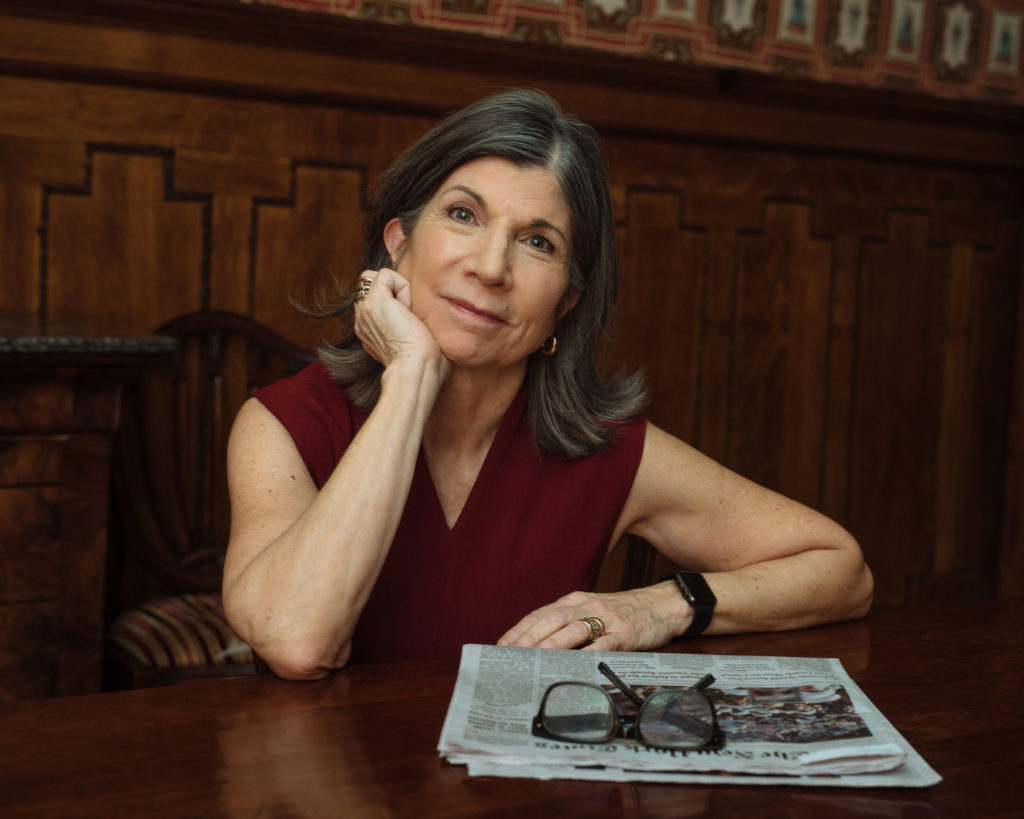
Anna wears the Aditi dress in pomegranate and the Juno earrings.
EVERY TIME I WRITE A NEW BOOK, it terrifies me, because it has to be different than the one before, and I’m never sure I can pull it off. My latest character, Nora, is quite different from me in many ways, and one of them is that she’s not particularly ambitious. She just doesn’t have that little Sterno fire underneath her chafing dish. Her professional life has been somewhat accidental. That’s not true at all for me. I think every fiction writer moves further and further away from autobiography the longer they do it.
MY BEST FRIEND IS ALWAYS OFFENDED by people who meet me at public events and say, “I feel like you’re my best friend.” She wants me to say to them, “I already have a best friend.” Of course, it’s very gratifying that people feel that way. Writing and reading make people feel connected to one another. You’re one woman sitting by yourself in Manhattan, writing about something that’s particular to you in your life. Then you go out into the world and 100 women say, “That’s exactly how I feel, too.” In a world that can be isolating, reading makes you feel less alone. To be part of that in any small way—boy, it’s nothing but a good feeling.
I THINK I’M REALLY AVERAGE, and that’s one reason why my work has a certain universality to it. Admittedly, I’ve had breaks and advantages that other women have not gotten, but at a basic level, I’m an everywoman. I started to realize that when I was a reporter: There was an easy give and take between me and other people that was good for my copy.
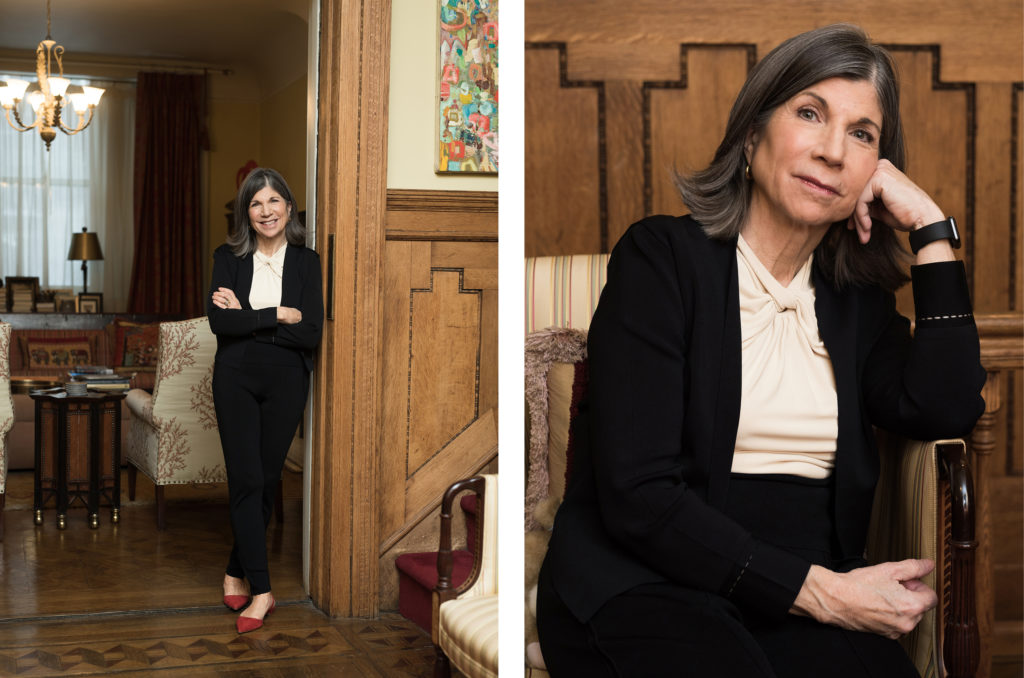
Anna wears the Pigalle pant and the Sant Ambroeus jardigan in black, the Walters top in cream, the Juno earrings, and the Federica flat in red.
I LEARNED OVER TIME TO DRAW THE LINE definitively between public and private. In the early days, most of the personal writing I was doing was about my three kids, and I always asked myself, “What will they think about this when they’re 16?” When I was writing a column for The New York Times called “Life in the 30’s,” I had a deal with my husband that if any column mentioned our family, I would give it to him first, and he could give me a thumbs-down if he wanted. If there was something about a column that bothered him, the column was dead. That was all there was to it. But because I was so careful anyhow, he never had to do that.
WHO DOESN’T TAKE CRITICISM PERSONALLY? Plus, when you’re writing about yourself, a lot of the criticism winds up not being of your work, but of you. There was a certain tone of “Who does she think she is?” that my critics had for a long, long time—they didn’t think a newspaperwoman had any right to do fiction writing. I have since learned to float above that criticism in the simplest way, which is that four or five books ago, I stopped reading reviews completely. It was so liberating. I stopped because I realized I wasn’t learning anything from them. Even reading good reviews can be paralyzing, because if somebody says, “Oh, she does this thing so well,” and your next book doesn’t have that thing in it at all, that little critic will be sitting on your shoulder saying, “You do that thing well. How come it’s not in this book? What’s wrong with you?” Now my best friend reads reviews for me, and says things like, “We hate Entertainment Weekly today,” or, “God bless those people at The Washington Post.” So I have a general idea of what’s going on.
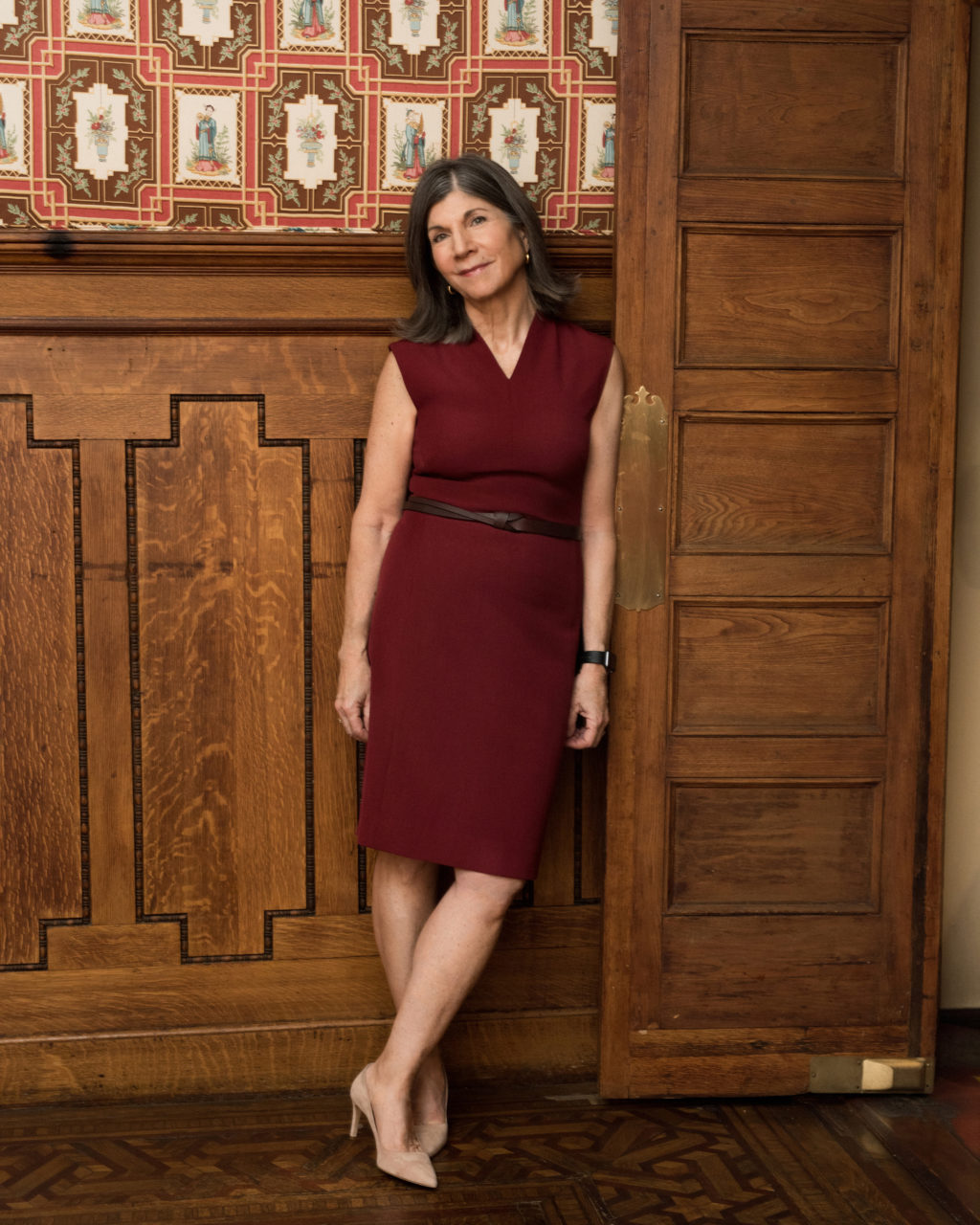
Anna wears the Aditi dress in pomegranate, the Broadway belt in mahogany, the Juno earrings, and the Vanessa pump in beige.
MY FATHER BASICALLY RAISED ME AS HIS OLDEST SON. He was a very young dad who expected to have a boy first, and biology was not going to foil his plan. He believed I was headed for world domination, and he would say things like, “Why did you get an A-minus? Where’s the A?” He was very disconcerted by the idea of me getting married; he just couldn’t see the point. He was of that generation who felt like you could either be a huge professional success, or a wife and mother, but not both. He’d say with some surprise, “Anna has this column, but she’s an excellent mother to those children.” As if being a columnist wipes out all your estrogen.
HERE’S WHAT KEEPS ME ON TRACK EVERY DAY: I have breakfast and read the newspapers. I either walk or run for four miles every morning, usually in Riverside Park if I’m in New York. I come back, mess around with the newspapers a little bit more, look at some websites, and talk to my best friend on the telephone. Then, usually, I’m in the chair by about 10:30 a.m. and I’ll work until 1:00 p.m., when I have lunch. If my son is working down at his office, I’ll eat with him. If not, by myself. Then maybe I’ll do two or three more hours of work, but usually not on fiction—on speeches or emails or things like that. Then I knock off for the day. But working on a novel is a bit of a 24/7 project in that you can be lying in bed at night and suddenly you think, Oh, oh, oh! There are long stretches where you’re not actively writing, but you’re still actively thinking. If you’re not always walking around with at least one foot in the world of the novel, it probably means it’s not working for you. But the temptation to do things other than write is always enormous. If there are towels in the dryer, by God, those towels need to be folded.
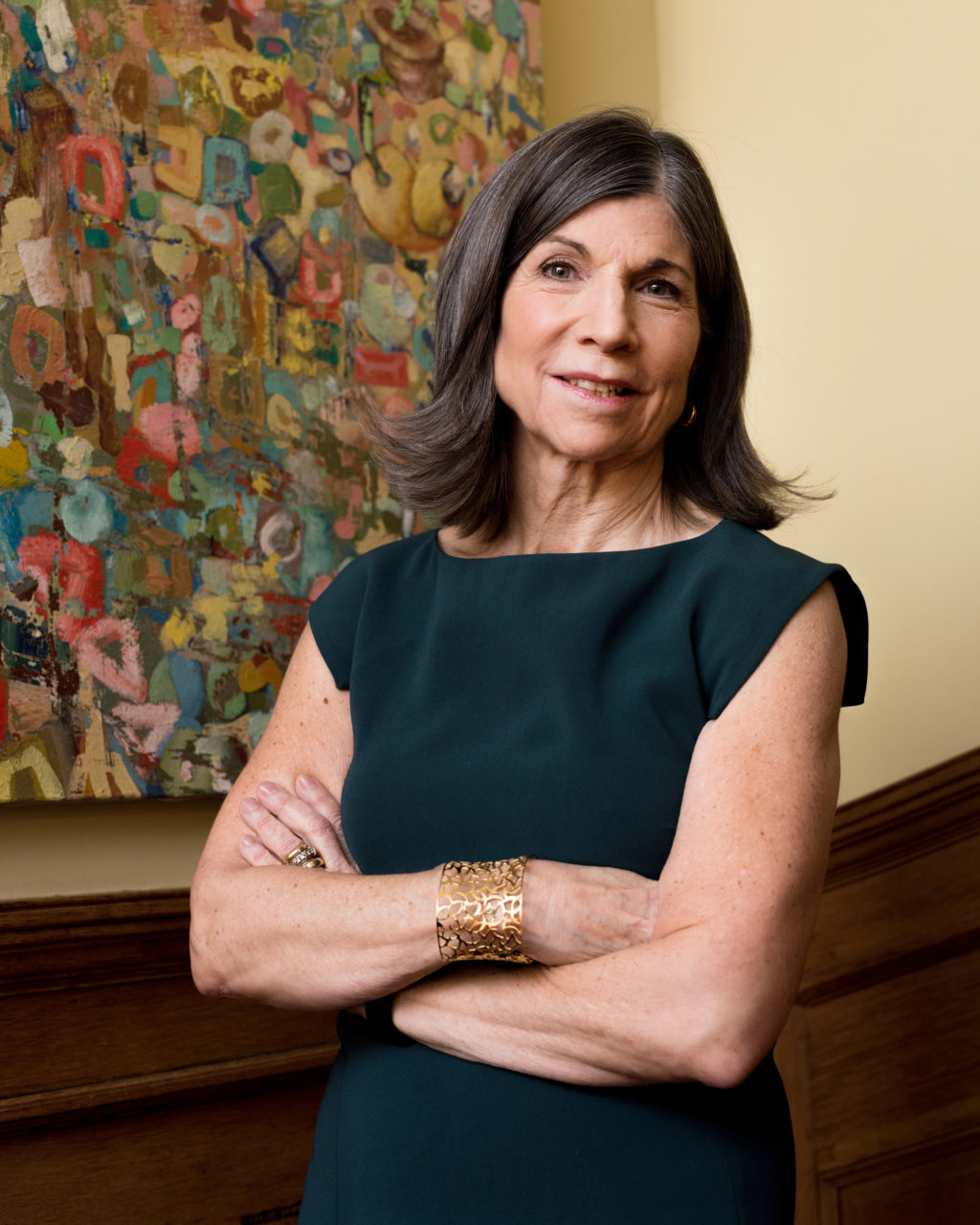
Anna wears the Sarah dress in viridian, the Juno earrings, and the Jupiter cuff.
WHEN YOU’RE WRITING A NOVEL, you can’t work all the time, or at least I can’t. The words start to blur after a couple of hours. I could do ten solid hours working on a column, between the reporting, the research, the telephone calls, the writing and the rewriting and the revising. But I can’t do ten hours writing a novel. The imagination is a muscle, and the muscle spasms. Some days you really hit it, and some days you think, Well, that’s all going to have to be deleted tomorrow.
WHEN I WON THE PULITZER PRIZE, my colleague Russell Baker said, “You will always know what the first line of your obituary will be.” For me, the single most gratifying thing was how happy it made my father. When I won, and I called him, he was driving around in his truck, listening to news radio because every 20 minutes, they would say it again on the air.
MY GREATEST SURGE OF CONFIDENCE CAME when I was about 50. I woke up one day and realized I didn’t give a damn what anybody thought of me. I also had an upbringing that was a real confidence builder: My father pushed me forward, and my mother had a gift for unconditional love. That’s a real one-two punch.
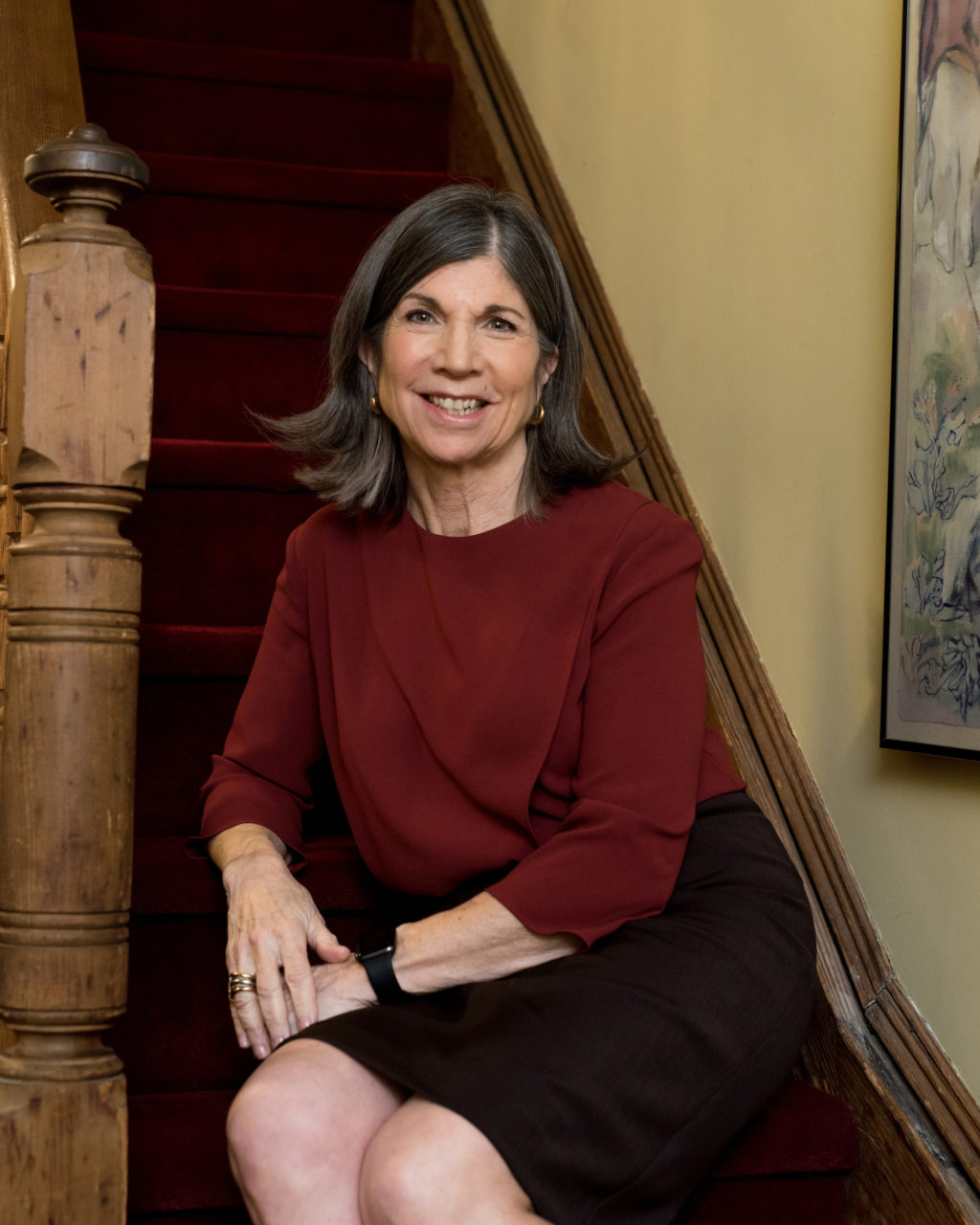
Anna wears the Bourgeois blouse in pomegranate, the Cobble Hill skirt in molasses, and the Juno earrings.
WHEN I GET DRESSED, and especially when I’m meeting readers, I want to look nice enough to telegraph respect, but not so zhuzhed that I look like I dropped in from Manhattan in a pair of Louboutins. Still, I was raised by a mother who never went out in the evening without lipstick. I would never go out looking like an unmade bed. There’s that balance of looking approachable without wearing yoga pants. My style has certainly changed over the years. I wear a lot of sleeveless sheath dresses now, and I certainly wasn’t wearing that 25 years ago. I’m also in better shape now than I was 25 years ago. Left to my own devices, I’ll always wear red or black.
THERE WAS ONE TIME IN MY REPORTING CAREER at The Times when it looked like I tanked on a big story, and it fed into a narrative about my shortcomings—the perception that I was a fancy writer who couldn’t cover hard news. I had a weekend to think about it, and I realized that the only way to deal with it was to address it head-on. I went in on Monday morning and said, “Can I cover City Hall?” The metropolitan editor was gobsmacked because it seemed so contrary to the human-interest features that I had been doing, but he decided to send me, and I covered City Hall for two years during the Koch administration. After that, everybody knew that I could cover hard news and my career proceeded apace. I don’t think the powers that be would have gone on to give me an op-ed page column if I hadn’t proven that I had more than one arrow in my quiver. There are moments in your career when people believe you are something that’s not satisfactory to you, and you’ve got to grab that perception by the throat and give the lie to it. Or, you can wait for your boss to put you in a position that shows what you can do, and sometimes that’ll happen—but in general, you’ve got to make it happen yourself.
Photographs by Katie McCurdy.





